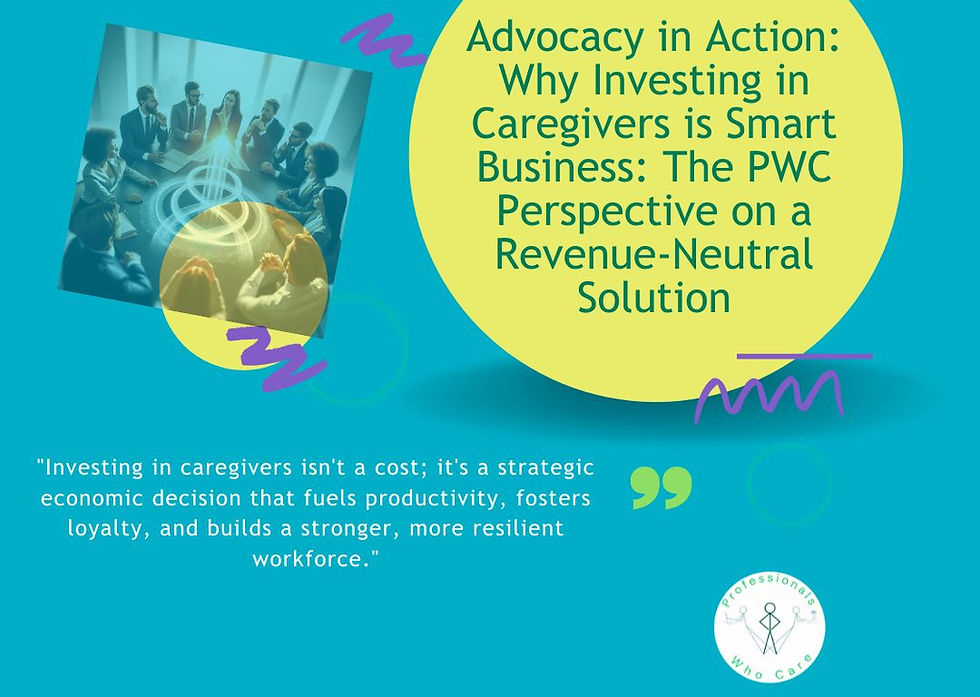Advocacy in Action: Why Investing in Caregivers is Smart Business: The PWC Perspective on a Revenue-Neutral Solution
- Mark Fukae
- Aug 16, 2025
- 3 min read

By Mark Fukae, Director of Advocacy, Professionals Who Care (PWC)
As professionals, we understand the bottom line. We value efficiency, productivity, and sustainable growth. But what if I told you that a hidden cost is impacting your workforce, leading to billions in lost productivity annually, and that there’s a fiscally responsible solution on the horizon?
At Professionals Who Care (PWC), we see this challenge every day in the lives of the 63 million Americans balancing their careers with family caregiving responsibilities. They are your employees, your colleagues, your talent. And their struggle to manage work alongside the intense demands of caring for loved ones is taking a significant toll, both personally and economically.
The Economic Reality of Unsupported Caregiving
The numbers speak for themselves:
Businesses in the U.S. collectively lose $44 billion annually due to caregiving-related productivity dips.[^8][^9]
Caregivers often spend thousands out of pocket each year, leading to financial strain that impacts their ability to contribute fully at work.[^7]
The burnout experienced by many caregivers results in increased turnover, absenteeism, and presenteeism -- all eroding your company's efficiency and talent retention.
Introducing the CARE Acts: A Revenue-Neutral Solution
This isn't just a humanitarian issue; it's an economic imperative. And the good news is, there are solutions that benefit everyone. PWC has been at the forefront of advocating for the Federal and Colorado CARE Acts, meticulously crafted to be revenue-neutral. This means:
No new taxes.
No new fees.
No new federal appropriations.
Instead, these acts are designed to modernize our approach to caregiving, ensuring that workplace policies reflect the realities of today's families. They propose:
Modernizing caregiving definitions.
Guaranteeing reasonable workplace accommodations like telework.
Banning caregiver discrimination.
Partnering with businesses through education and technical assistance.
The Business Case for Supporting Caregivers
For businesses, the CARE Acts translate directly into:
Reduced Turnover: By offering flexible work options and support, companies retain valuable, experienced employees who might otherwise leave the workforce due to caregiving demands.
Increased Productivity: Supported caregivers are less stressed, more focused, and better able to perform their jobs.
Enhanced Employee Morale: Companies that demonstrate empathy and support for their employees' personal lives foster a more loyal and engaged workforce.
The Colorado CARE Act, for instance, is projected to yield $17.4M-$69.4M in annual savings for Colorado businesses just from reduced turnover.[^3] The Federal CARE Act is estimated to have a $5.3 billion net positive economic impact over 10 years, through both federal program savings and new tax revenue from better workforce retention.[^6]
Join PWC in Advocating for a Smarter Future
Supporting caregivers isn't a cost; it's a strategic investment in our workforce and our economy. At PWC, we believe that an equitable future where all caregivers can provide care with supports and a living wage for their vital work begins with fiscally responsible policies like the CARE Acts.
Learn more about our work at Professionals Who Care (PWC) and join us in building a more supportive and productive economy for all.
Sign our petition to support the Federal and Colorado CARE Acts on Change.org: Sign here!
For a more in-depth exploration of the CARE Acts, revenue-neutral strategies, and our vision for an equitable caregiver future, subscribe to Mark Fukae's Substack, 'The Revenue Neutral Caregiver': https://therevenueneutralcaregiver.substack.com/
References
[^1]: AARP & National Alliance for Caregiving. (2025). Caregiving in the U.S. 2025. AARP Public Policy Institute & National Alliance for Caregiving. DOI: 10.26419/ppi.00373.001. https://www.aarp.org/pri/topics/ltss/family-caregiving/caregiving-in-the-us-2025/ [^2]: Bell Policy Center. (2025, February 13). Mental health and caregiving: How we can best care for caregivers. https://www.bellpolicy.org/2025/02/13/mental-health-and-caregiving-how-we-can-best-care-for-caregivers/ [^3]: Bell Policy Center. (2025, May 1). The state of aging in Colorado 2025. https://www.bellpolicy.org/2025/05/01/the-state-of-aging-in-colorado-2025/ [^4]: Center to Advance Palliative Care. (2025). The National Alliance for Caregiving and AARP release caregiving report. https://www.capc.org/blog/new-data-on-family-caregivers-in-the-us/ [^5]: The John A. Hartford Foundation. (2025). National Alliance for Caregiving: Caregiving in the U.S. 2025 report. https://www.johnahartford.org/resources/view/national-alliance-for-caregiving-caregiving-in-the-us-2025-report [^6]: National Academy for State Health Policy. (2024). National strategy to support family caregivers progress and impact report 2024. https://nashp.org/national-strategy-to-support-family-caregivers-progress-and-impact-report-2024/ [^7]: Family Caregiver Alliance. (2023). Caregiving and Employment: Work-Life Compatibility. https://www.caregiver.org/work-and-caregiving [^8]: Forbes. (2025, June 25). The $157 Billion Caregiving Crisis. https://www.forbes.com/sites/glennllopis/2025/06/25/the-157-billion-caregiving-crisis-employers-can-no-longer-ignore/ [^9]: Harvard Business Review. (2025, June). Why Caregiving Costs U.S. Employers $157 Billion. https://hbr.org/2025/06/why-caregiving-costs-us-employers-157-billion [^10]: Roosevelt Institute. (2024). The Economic Value of Unpaid Caregiving in the United States. https://rooseveltinstitute.org/publications/economic-value-unpaid-care




Comments